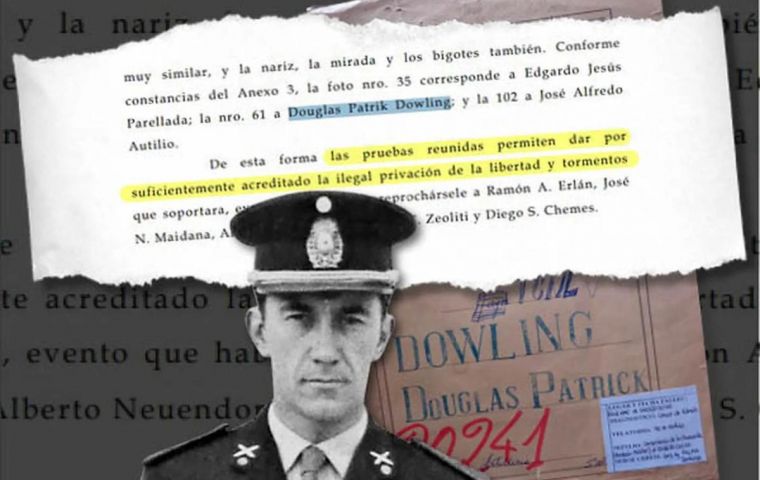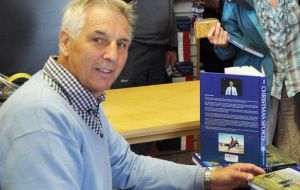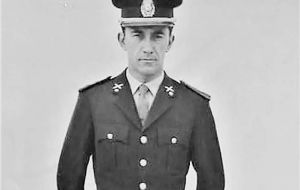MercoPress. South Atlantic News Agency
The Argentine officer who terrorized and favored a final solution for Islanders during the Falklands' occupation
 The impeccably dressed Mayor Patrick Dowling, of Irish origin who loathed everything British, and police-abused Islanders during the occupation
The impeccably dressed Mayor Patrick Dowling, of Irish origin who loathed everything British, and police-abused Islanders during the occupation  Penguin News Editor, Lisa Watson, then 12, was threatened her family's home at gun point by Dowling (Pic YouTube)
Penguin News Editor, Lisa Watson, then 12, was threatened her family's home at gun point by Dowling (Pic YouTube)  Patrick Watts at the time head of the Falklands radio station complained to Commodore Bloomer Reeve of the excesses committed by Dowling
Patrick Watts at the time head of the Falklands radio station complained to Commodore Bloomer Reeve of the excesses committed by Dowling  Dowling said “the problem were the Islanders and that without them, London would not send troops. So it was better to 'exterminate' them”
Dowling said “the problem were the Islanders and that without them, London would not send troops. So it was better to 'exterminate' them” The visiting Argentine reporter Hugo Alconada Mon who spent time in the Falkland Islands reporting for the Buenos Aires daily La Nacion, on the 40th anniversary of the April 2nd Argentine military invasion and occupation of the Falklands, has included a story on an Argentine army officer.
Douglas Patrick Dowling, who terrorized Islanders and even considered “a final solution” for the Falklands population. “Without the Islanders, London will not send troops to recover the Islands, so the word extermination was used” according to witnesses of the conversation sponsored by “the Englishman” as he was identified given his language fluency.
Dowling of Irish origin who loathed everything British, was finally removed from the Islands by the occupation forces given his excesses, and back in Argentina, with the return of democracy, appeared repeatedly in the list of officers responsible for crimes against humanity.
The piece begins by saying that Dowling is the name of the Argentine military officer whose only mention impacts on the men, women and children who had to deal with him forty years ago during the Falklands war. Some Islanders still suffer post traumatic stress on the mention on his actions, recalling the most brutal practices of the Argentina dictatorship.
He was the “bête noir” of the Islanders and Dowling's name figures in the list of perpetrators of Conadep, (the Argentine commission on Disappeared Persons), and in at least two specific cases of crimes against humanity. He went into retirement at the start of the recovered Argentine democracy and died in 2000. But for the Islands it is as if he never died, they still talk about him, since many of his victims still fear him. Such is the case of the young girl Dowling threatened with a rifle pointing straight to her face or the men he simulated executing, or those he bashed to the ground, or the Islander he flew in a helicopter and in midair opened the side door, like in the “death flights” so common during the Argentine military dictatorship. Or even the women to whom he proclaimed the benefits of a “final solution”, all of which in violation of the Geneva Convention.
If ending with the Islanders was his real intention, it will never be known, because he only spent four weeks in the Falklands, since a close aide of General Mario Benajmin Menéndez ordered his return to Argentina given concern over his actions. But the long shadow of the Argentine officer is still an obstacle for dialogue. He would present himself as Patrick Dowling, descendant of an Irish family and admitted loathing everything British, although one of his “nom de guerre” in the clandestine detention and torture centers in Argentina was “the Englishman”.
Douglas Patrick Dowling landed in Stanley as a 36 year old Army Major in early April 2nd, three days before the city renamed Puerto Rivero was later identified as Puerto Argentino. He arrived as head of the Military Police, although his main mission was counterespionage, detecting 'rebellious' Islanders who could help with resistance or provide information to the British troops. And very soon it became clear that he knew who was who in the Falklands, according to coincidental reports.
The testimonies collected by La Nacion in the Islands deepen a side of the war that /many prefer to silence or hide. Such as the reports from former Argentine conscript combatants who suffered physical and psychological tortures from an estimated one hundred officers, such as staking and burials, and are still claiming a ruling from the Argentine Supreme Court. But are they crimes against humanity, and thus still punishable as an Argentine federal court decided? or are they common crimes which have thus prescribed, as an appeals court decided?. But now Islanders provide further testimonies of those aggression.
Threatening Lisa Watson, 12, at gun point
The most brutal example of Mayor Dowling's actions among Islanders was against a young 12 year old girl in 1982. Lisa Watson, currently the editor of the Falklands weekly, Penguin News. Her father Neil called the Argentine to report that six British marines who managed to escape when the 2 April landing were prepared to surrender. Not long after two Pucara aircraft overflew the Watson farm and three helicopters landed. With the marines hand cuffed Dowling kicked open the door of the house and forced all the Watson family against the wall, but the girl remained seated, despite the begging of her parents and the shouts of Dowling who then pointed a rifle at her face and several times threatened to shoot. Finally the Argentine officer gave up and the girl remained seated.
“I remember Dowling had his helmet on, but that is all I can recall. It was all so quick, although I remember some of his factions, he was rather nice looking, very much clean cut. but I was a kid”, Lisa told La Nacion.
Witnesses coincide on those points. Islanders described Dowling very much concerned about his personal appearance, well shaven and combed, who spoke fluid English and was always with his uniform impeccable and ironed, very much in line with one of the victims of El Vesubio, a clandestine detention center. Hugo Luciani recalled him as a man of culture, with a strong clear voice, and even his uniform, shoes, showed he was a person who was well educated.
Other testimonies include that of Robin Pitaluga who died a couple of years later. ”Dad was a man of strong character and he was contrary to the doctrinarian process the Argentines pretended to impose on the Islanders. One night he heard a radio message from Admiral Sandy Woodward (head of the Task Force) who wanted to reach (Argentine military governor) Menendez so that he surrendered. And that is what my father did. A little later helicopters appeared“, said Nicholas Pitaluga. ”I remember that when they took Dad away, Mom wanted the military to give her a document on his arrest, because we knew very well what happened in Argentina when they took someone with them in a helicopter. So one of the military effectively gave my mother a receipt as if Dad was a merchandise...”
In Stanley (then Puerto Argentino) the worst happened, “they led him to the Police Station in Stanley where Dowling considered him a leader of rebellious Islanders. So they crossed the road with him, had Dad on his knees next to the sea and told him he had but one bullet, and then fired several times to see if he could ”break“ him. Later he was left under house arrest”, according to Nicholas who had done the high school in Cordoba, where one of his teachers disappeared. On April 2nd Nicholas was in Buenos Aires, on return from university in New Zealand. He never returned to Argentina although keeps in contact with former class mates.
“Some Argentine military spoke openly about their interest in going further”, revealed Nicholas. They spoke about “a final solution”, but others did respect the military honor code, so I prefer to think things could have been far worse for the Islanders. In fact Dowling was like (navy captain) Alfredo Astiz. I hope both are in prison and remain in prison“, .
Like the ”death flights“
Dowling liked to act with a spectacular display. He also appealed to helicopters when he went after Bill Luxton. Twelve tactical frogmen with machine guns and grenades jumped off a Puma helicopter and surrounded the house. Dowling flew off with Bill, wife and teenage son to Stanley/Puerto Argentino. But in the midst of the flight the family feared for their lives. It happened when the side door of the helicopter was opened when over the sea, something that reminded the Luxton of the Death Flights, which by then were well known outside Argentina.
”We already had had a previous incident on April 2 or 3, when I was carried to the Police Station, 'if it was up to me I would shoot you all, and you would be the first', Dowling told me“ recalled Luxton who at the time worked for government. ”Later he warned me to keep out of trouble, we have very bad reports about you, so be careful“, and Dowling then admitted having detailed information on over 600 of us Islanders. I can't say if it was true, but I can say he knew a lot about me”.
Luxton was not the only person Dowling mentioned in his intelligence reports. “I know all about you” he warned John Smith a British merchant seaman who arrived in the Islands in 1958, fell in love with a local girl Ileen and stayed to live in the Islands. Today in his eighties he was the first director of the local Museum and has written several books. He is considered the top living historian. “Dowling had reports on all of us, with precision descriptions of political ideas, affinities and relatives. The work of good intelligence over the course of ten years”, Smith told La Nacion in his home in the outskirts of Stanley. “Not long after a conscript was ordered to keep track of his whereabouts”, and quite soon Smith was feeding him. “Contrary to officers, soldiers went hungry. In the west of Stanley all the cats disappeared, a horse and several sheep were slaughtered”.
Dowling repeated his game with a member of the local police, Anton Livermore. “He repeated my life, my family, which school I had gone to, my previous jobs. I simulated not to speak Spanish, but he was well aware I had spent two years in Argentina”, recalled Livermore. In effect the Islander has spent part of his high school in Bariloche and was well aware firsthand how the military dictatorship proceeded. “I would not be surprised if Dowling has remained more time in the Islands, not many Islanders would have been left”.
Dowling liked to spread fear among the Islanders. Sometimes deliberately, in others without knowing. At the Upland Goose, at the time one of two hotels in Puerto Argentino/Stanley he demanded from the owner Desmond King to hand him over half the rooms and food for him and his officers, “either the good way of the bad way”. It was during one of those meals at the Upland Goose that Dowling discussed with other Argentine officers the idea of implementing a “final solution” with Islanders, while King's two daughters Anna and Alison catered. Both had studied in Montevideo and spoke good Spanish, which they hid. “Dowling said the problem were the Islanders and that without us, London would not send troops. So it was better to 'exterminate' us. That was the verb he used”, insists Alison. Next to her Anna nods confirmation.
Excesses continued
Incidents were repeated. Dowling called on two helicopters to fly to San Carlos, where he had everybody line up, men, women with babies in their arms, and children next to a shed. When the manager of the farm Allan Miller complained about the abuse, the officer hit him to the ground. “Several times he hit his head with the butt of a rifle or gun, and when he was on the ground, he stood behind and began to interrogate him” recalls his brother Tim, a hydroponics farmer who also looks after the Argentine military memorial at Darwin and the British cemetery at San Carlos.
Dowling also had interrogation sessions at the Police Station in Puerto Argentino/Stanley. One of the victims was Philip Rozen a Public Works staff who he accused of spying, while his officers frisked, groped and insulted him. Something similar with Gerald Cheek, air comptroller of the local airport. “Following the conversation Dowling pulled out a pistol and banged the desk, exasperated with my replies”, recalls Cheek. Rozen was deported and Cheek sent to West Falkland.
However at the end the methods of Dowling proved counterproductive for Argentine plans. Islanders redoubled undercover collaboration with the British troops, while he was sent back to Argentina on 26th April, weeks before the British landing in San Carlos Bay. The order came from the secretary general of Menendez, vice commodore Carlos Bloomer Reeve who knew the Islands and the locals since the seventies, and was one those responsible for implementing the “Communications Accords” of that time.
“Bloomer Reeve was a good person and looked after us. Without him everything would have been more difficult”, according to Patrick Watts who at the time was head of the local radio. Patrick also came under the abuses of Dowling. “When they arrested Cheek, who was my neighbor, to take him to the police station, I protested and ended with a pistol to my stomach. Luckily an Argentine captain happened to pass by, he knew me and defended me”. Sometime later Patrick went to see Bloomer Reeve...
“Where are you sending all this people?”
“What people?, remembers Patrick that the Argentine Air Force officer replied.
”Are you going to make them disappear? Are you going to dump them in the bay as you do in the River Plate?“
”Don't be stupid. Give me a minute“.
“In front of me, Bloomer Reeve lifted the phone”, recalls Patrick. “Then he hanged and said an only word, Dowling. Not long after Dowling was transferred back to Argentina”.
Crimes against humanity
Dowling was assigned to the Falklands/Malvinas until 26th April according to a copy of his file from the Argentine Army in a federal court of Santa Fe, where he was also investigated for his participation in crimes against humanity, as a member of Intelligence detachment 122. Dowling died in 2000 but another defendant in the case, who was military governor of Santa Fe province, Jose Maria Gonzalez was condemned to life prison, guilty of several homicides, illegal arrests and illegal house searches.
The Army file on Dowling states he started in December 1964 and retired as Lieutenant Colonel in 1986, and received multiple warnings and arrests given his character. However his commanding officers described him as “serious, subordinate, respectful and with command capacity”.
However this was not the opinion of Bloomer Reeve. Second in command behind General Menendez, as Secretary General responsible for the occupied Malvinas population, he retired from the Air Force with the rank of Brigadier. In an interview with Graham Bound Bloomer Reeve confirmed that he ordered Dowling sent back to Argentina. Graham knew Bloomer Reeve from his time in the Falklands and interviewed him for this book, “Invasion 1092: the Falkland Islanders Story”.
According to Bloomer Reeve, Dowling considered every Islander an enemy and many other young Argentine officers felt the same way but did not have the power. This man on the contrary was the Chief of Police. He had power to implement his ill feelings towards Islanders. Following the incidents, Bloomer Reeve called Dowling to his office, and ordered him to be more cordial towards Islanders, reminding him he had to obey superior orders, even from a higher ranking Air Force officer. Dowling responded with rudeness and immediately went to met with Menendez and asked support for this transfer back to Argentina. Three days later he left Puerto Argentino/Stanley, where he-s still remembered and feared.




Top Comments
Disclaimer & comment rules-

-

-

Read all commentsWhat are you saying Thunk? I literally didn’t get a word of that one… So this Dowling fellow want to exterminate the Falklanders and you are suggesting it’s the Falklanders with a Eugenics boner?
Apr 22nd, 2022 - 06:04 pm +5Gauchito Drink, your own racist views and advocacy of eugenic cleansing for anyone you oppose make anything you say grimly clear, especially when you are dissembling... ;)
Apr 24th, 2022 - 06:51 pm +3Geeeeeeeeeee....
Apr 24th, 2022 - 01:00 pm -4- Judging by the extreme low number of Brainwashed Anglo Turnips commenting on the above..., quite interesting article..., I Tænk it can be concluded that literally every Brainwashed Anglo Turnip in here at PenguinPress did get every word of my comment...
Chuckle..., chuckle...
Commenting for this story is now closed.
If you have a Facebook account, become a fan and comment on our Facebook Page!